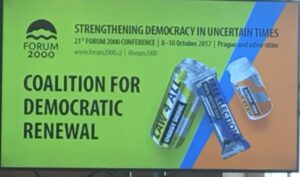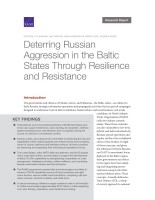A Lithuanian lawmaker pushed back against Chinese propagandist ‘clowns’ this week after politicians from the Baltic states of Lithuania, Latvia and Estonia met Taiwan’s top leadership in Taipei, Newsweek reports. None of the Baltic states has official diplomatic relations with Taipei, while all three have formal relations with Beijing, but the democracies say they have connected through universal values and shared opposition to authoritarianism.
Lithuania, facing pressures from both Russia and China as well as neighbors like Belarus, finds itself on the fault lines of shifting geopolitical tectonic plates, notes Brian Katulis. It also faces new challenges to its democracy on three key fronts, he writes for The Liberal Patriot:
- Russia – Russia’s Putin has initiated a number of destabilizing moves across the region in recent years. The Biden administration is currently worried about mounting Russian threats to Ukraine, but it should also keep an eye on what Russia has done for years to intimidate Lithuania with its military exercises and political pressure. NATO meets this week in Latvia, and Russia’s threats to regional security are high on the agenda.
- Belarus – Lithuania’s next-door neighbor has been drawing even closer to Russia in recent years. Belarus has exploited the global migration crisis for political purposes, engineering a scheme aimed at putting pressure on Europe by sending migrants from around the world to their borders and reinforcing a gated community mindset in many open societies. In addition, Lithuania has offered a haven for opposition activists fighting an uphill battle for freedom in Belarus.
- China – In recent months, China has targeted Lithuania in a series of political and economic moves because Lithuania built closer ties to Taiwan, an independent democratic country threatened by China. Lithuania also advised its officials not to use Chinese phones found to have censorship software and withdrew from a regional diplomatic grouping promoting China’s Belt and Road infrastructure initiative. On a visit to Washington last week, Lithuania’s Foreign Minister Gabrielius Landsbergis raised the prospect of working on a coordinated boycott of the Winter Olympics scheduled for Beijing next February.
 Lithuania brings an invaluable perspective to the challenge of democratic renewal, said US Under Secretary Uzra Zeya. Lithuanians have prevailed in the transition from authoritarianism to democracy, built solid democratic institutions, and offered refuge for those battling autocratic regimes – all in our lifetime,” she told the “Future of Democracy” Forum in Vilnius.
Lithuania brings an invaluable perspective to the challenge of democratic renewal, said US Under Secretary Uzra Zeya. Lithuanians have prevailed in the transition from authoritarianism to democracy, built solid democratic institutions, and offered refuge for those battling autocratic regimes – all in our lifetime,” she told the “Future of Democracy” Forum in Vilnius.
Mr. Landsbergis, an epic documentary (above) about Lithuania’s struggle to restore its independence, won top honors at the 34th annual International Documentary Film Festival Amsterdam (IDFA) 2021 Awards Ceremony in Amsterdam on November 25, Radio Free Europe/Radio Liberty (RFE/RL) reports. The film, commissioned by RFE/RL’s Current Time digital network, won the Best Film award for director Sergei Loznitsa and the Best Editing prize for Danielius Kokanauskis.
The IDFA jury found that “On every level of craft, [Mr. Landsbergis] represents a monumental achievement that fully explores the role one man, one nation, and one historical moment can play in the still-unfolding story of the global struggle for freedom and self-determination.”
A senior foreign policy advisor told Katulis his main idea was to help make his country a “hub” for freedom, especially in the spaces where U.S. public diplomacy once helped shape the information landscape, adding that the US should be more deeply engaged in the battle of ideas between different political systems. In essence, Katulis notes, the official was talking about how to counter what the National Endowment for Democracy ‘s Christopher Walker has called “sharp power” – the assertive efforts by autocratic governments to spread confusion, limit criticism, and create dysfunction and gridlock in open societies like America and Lithuania.
 The Baltic state is clearly punching above its weight, Lithuanian Vice Minister Mantas Adomėnas and US Assistant Deputy Secretary of State Kara McDonald told The Cable, a production of the Institute of Current World Affairs and the Transatlantic Democracy Working Group.
The Baltic state is clearly punching above its weight, Lithuanian Vice Minister Mantas Adomėnas and US Assistant Deputy Secretary of State Kara McDonald told The Cable, a production of the Institute of Current World Affairs and the Transatlantic Democracy Working Group.
But behind the noble rhetoric, a pragmatic calculation can be discerned, says Carnegie analyst Denis Kishinevsky. By acting as the driving force behind anti-Chinese initiatives, Lithuania hopes to focus U.S. attention on the region and procure guarantees that Washington will not scale back its presence in Eastern Europe and the Baltic states.
What is the Lithuanian perspective on democracy, media and conspiracy theories? National Endowment for Democracy partner GLOBSEC gave an overview in its 2021 Trends report for Lithuania (above).







